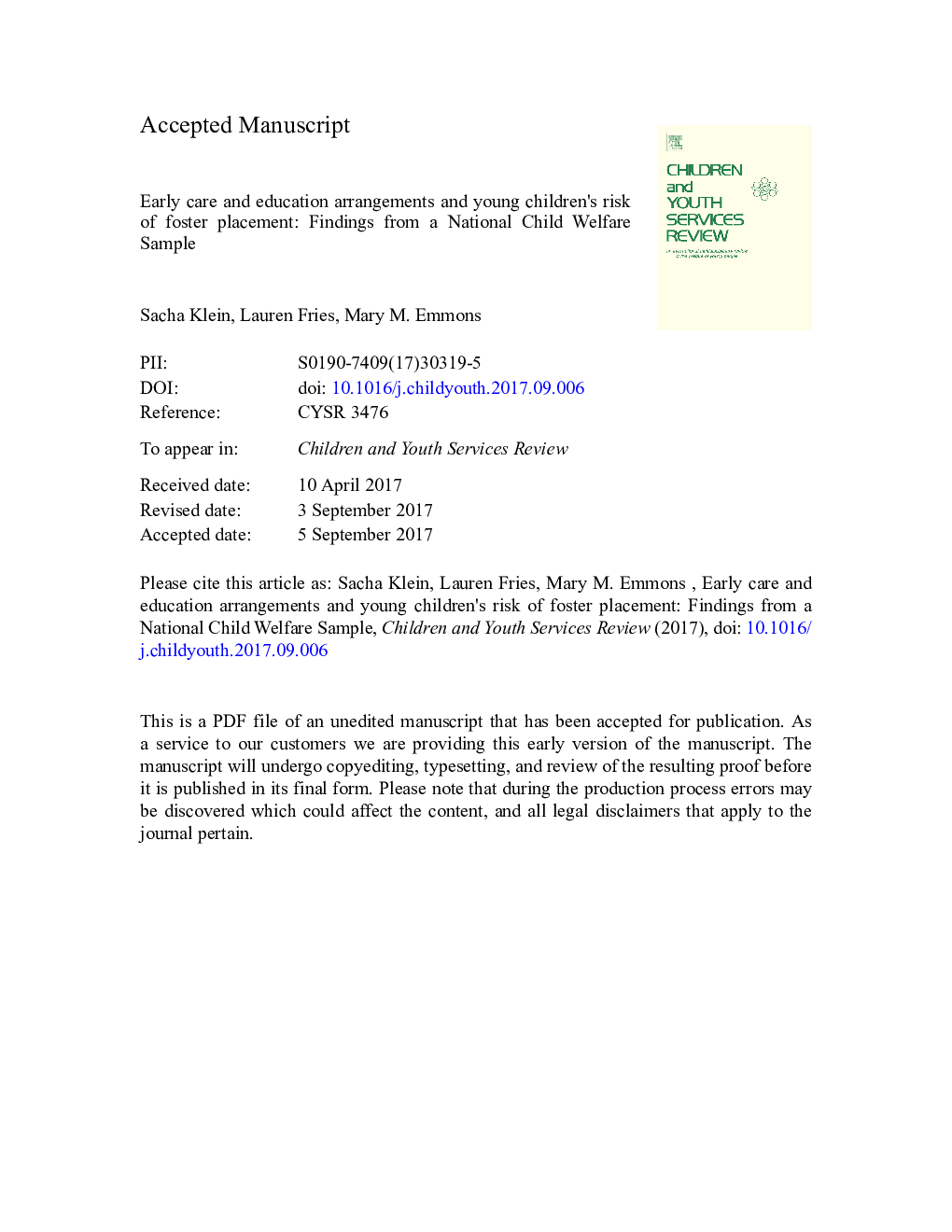| کد مقاله | کد نشریه | سال انتشار | مقاله انگلیسی | نسخه تمام متن |
|---|---|---|---|---|
| 6833560 | 1434426 | 2017 | 50 صفحه PDF | دانلود رایگان |
عنوان انگلیسی مقاله ISI
Early care and education arrangements and young children's risk of foster placement: Findings from a National Child Welfare Sample
ترجمه فارسی عنوان
رهنمود های مراقبت های اولیه و آموزش و پرورش کودکان خطر ابتلا به پرستاری: یافته های ملی نمونه های رفاه کودکان
دانلود مقاله + سفارش ترجمه
دانلود مقاله ISI انگلیسی
رایگان برای ایرانیان
کلمات کلیدی
مراقبت از کودکان، مراقبت های اولیه و آموزش، نگهداری فرزند، شروع سر پیش دبستانی، قرار دادن خارج از منزل،
موضوعات مرتبط
علوم پزشکی و سلامت
پزشکی و دندانپزشکی
پریناتولوژی (پزشکی مادر و جنین)، طب اطفال و بهداشت کودک
چکیده انگلیسی
A primary goal of the U.S. child welfare system (CWS) is to maintain children investigated for maltreatment in their parents' homes whenever safely possible. This study explores the possibility that early care and education (ECE) services (e.g., child care, preschool, day care) can help the CWS achieve this goal by using a nationally representative sample of children referred to CWS for suspected maltreatment to measure the relationship between ECE receipt and the likelihood that 0-5Â year olds in the CWS will be placed in foster care approximately 18Â months later. Specifically, logistic regression analyses explore the relationship between: (1) regular ECE participation (yes/no), and (2) type of ECE arrangement (Head Start, other center- or home-based ECE, family/friend/relative ECE, other ECE, and multiple types of ECE) and foster placement risk. After controlling for multiple socio-demographic characteristics and foster placement risk factors, children who received ECE (yes/no) were no less likely to be placed in foster care than children who received no ECE. However, when exploring type of ECE arrangement, children who received Head Start were 93% less likely to be placed in foster care than children with no ECE. Children who participated in multiple types of ECE were almost seven times more likely to be placed in foster care than children with no ECE. These results suggest that Head Start may help maltreated children avoid foster placement and that experiencing multiple types of ECE is a risk factor for foster placement. It is recommended that caseworkers routinely assess the ECE service history and needs of families with young children who come in contact with the CWS, paying attention to the type and number of ECE services used.
ناشر
Database: Elsevier - ScienceDirect (ساینس دایرکت)
Journal: Children and Youth Services Review - Volume 83, December 2017, Pages 168-178
Journal: Children and Youth Services Review - Volume 83, December 2017, Pages 168-178
نویسندگان
Sacha Klein, Lauren Fries, Mary M. Emmons,
